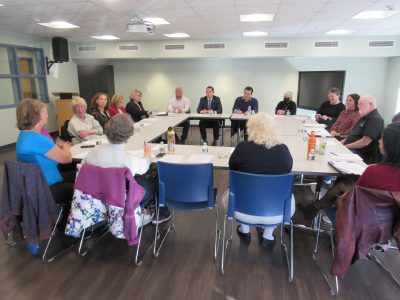Help Sought for Organizations Managing Food Insecurity Challenges
News Based on facts, either observed and verified directly by the reporter, or reported and verified from knowledgeable sources.

Feeding the hungry is a complicated process, especially if you’re an organization that helps battle the rising numbers of people experiencing food insecurity.
Last week a group of food assistance groups gathered to discuss challenges during a roundtable discussion at the Brewster Public Library. The forum was hosted by Assemblyman Matt Slater (R-Yorktown) who was joined by Putnam County Executive Kevin Byrne.
Among the diverse 13 groups attending were high-powered food banks such as Feeding Westchester, Caring for the Hungry & Homeless of Peekskill (CHHOP) along with smaller pantries and farms dedicated to getting food on the table of those most in need.
Slater’s goal was to have a greater understanding of the organizations’ experiences, including coordinating distribution, complying with state regulations, grant writing, filing various applications and handling enormous amounts of paperwork required from most nonprofit organizations seeking funds.
A spike in the number of people needing food assistance was seen last March when
monthly Supplemental Nutrition Assistance Program (SNAP) benefits were reduced coupled with rising food prices. According to Federal Reserve Economic Data, 74,000 people in Westchester who participate in SNAP are experiencing a significant loss of food assistance. Putnam County had 2,134 SNAP recipients in 2020.
“Our numbers have tripled,” said Cynthia Knox, CEO of CHHOP and whose food pantry receives produce from local farms. “As of last year, we provided food to 89,000 individuals, and the trend continues.”
Karen Erren, president and CEO of Feeding Westchester, said that before the pandemic, Feeding Westchester distributed 10 million pounds of food to pantries and other organizations in a year. But last fiscal year, which ended June 30, it distributed 21 million pounds.
“We work with 300 partners throughout (Westchester) county,” said Erren, who noted that the partners senior centers and schools in addition to food pantries and soup kitchens. “Folks in Westchester County fall under the really ludicrous federal poverty level of $28,000 for a family of four. There are those who are working but can’t afford to live self-sufficiently. We gave a quarter of a million folks three days’ worth of food in just a month, which is nothing. There’s just so much more to do. We say a well-fed person can have many problems but a hungry person only has one.”
Sue Burcroff and Beth Chandler of the Brewster Community Food Pantry said their biggest challenge was finding a new space to house their operations. Their current location at 10 Park St. in Brewster is slated to be torn down as part of an urban renewal project, Burcroff said.
“We have no place to go and we can’t find a place that we can afford,” she said. “This is happening while I have a 35 percent increase in my numbers. I have to find more money or more food. Here in Brewster, we feed a huge amount of people and we need a final home.”
Slater said he and Byrne would help Burcroff.
“Your problem is very clear to us and we need to put our heads together, coordinate with the other departments to see if there are other opportunities that we can identify,” Slater said. “We are happy to do that.”
The many regulatory agencies food assistance programs are required to deal with is another obstacle, from the state health department to appealing to entities for reimbursements.
“Our time and energy are often spent in duplicative efforts,” said Knox. “We deal with at least seven multiple agencies whose efforts are not coordinated with one another and there is no entity who is looking at these issues.”
Slater proposed the creation of a food czar to oversee coordination of different components and if efforts were being duplicated.
“But we don’t want another layer of bureaucracy,” he said. “We want to shed hours off your timelines, not add to them. It just takes too long to get things done.”
Streamlining certain financial applications to be coordinated with various state and local agencies was something many at the forum supported.
“It could be a conversation we can at least start to have and raise on the state level,” Slater mentioned. “We want to save you time and money and hopefully expedite the many processes.”
Others at the forum included Stacey Farley of Davoren Farm in Garrison; Ellen Bloom of NewYork-Presbyterian; Roni Rodman, president of the Putnam Valley Food Pantry; Marisa O’Leary and Jerry Grant of the Putnam Community Action Program (CAP); Cindy Smith of St. Mary’s Food Pantry in Mohegan Lake; and Jean McGee and Helen Iral of Second Chance Foods, a pantry in Brewster.

Abby is a local journalist who has reported on breaking news for more than 20 years. She currently covers community issues in The Examiner as a full-time reporter and has written for the paper since its inception in 2007. Read more from Abby’s editor-author bio here. Read Abbys’s archived work here: https://www.theexaminernews.com/author/ab-lub2019/
